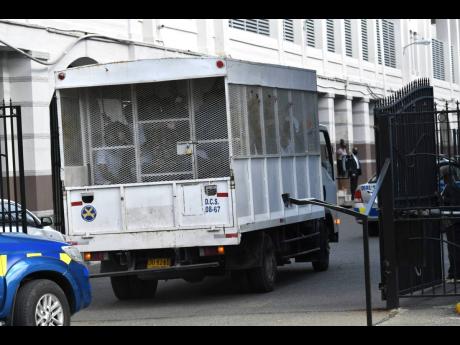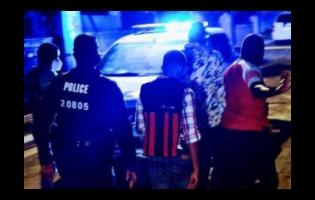Judge to rule on ‘Blackman’ no-case submission on Monday
Chief Justice Bryan Sykes is to rule on Monday whether Andre 'Blackman' Bryan, the alleged leader of the Clansman-One Don Gang, and 23 of his co-accused, will continue to stand trial in the ongoing gang trial in the Home Circuit Court.
No-case submissions have been made for 24 of the 28 remaining defendants who were initially charged on a 25-count indictment for being a part of a criminal organisation. The majority of the defence lawyers have made submissions in hopes of getting the entire case against their clients thrown out. However, in the case of Bryan, his lead attorney, Lloyd McFarlane, has challenged only one of the 13 remaining counts against him.
The high-profile case commenced last September with 33 defendants, including one female. Four of the defendants -- Damaine Elliston, Rushane Williams, Rivaldo Hylton and Owen Ormsby -- were freed after the Crown indicated that it did not have sufficient evidence to mount a case against them. A fifth defendant, Dwayne Salmon, was freed after the trial judge upheld a no-case submission against him.
On Thursday, Justice Sykes adjourned the matter after the prosecution made closing arguments in its response to the defence's no-case submissions. Prior to the adjournment, the judge again raised concerns about the prosecution's failure to present certain evidence to support its case. He pointed, for example, to the August 2015 murder of Damaine 'Doolie' Forrester on Chancery Street in St Andrew.
Two former members of the One Don Gang had testified that Bryan ordered the hit on Forrester, who was a bag packer at a supermarket.
The officer who processed that scene testified that she had taken photographs but that the compact disc on which they were stored disappeared. She also said that the server on which the images were stored developed problems and crashed, resulting in the photographs being lost.
"That's why I say it seems to be a faith-based statement, we must accept it on faith," the judge remarked after being told there was no evidence to support the police report that a homicide had been committed.
"Can't be that you have a homicide in the 21st century and you have no record," the judge said, while indicating that this was similar to another alleged murder in the case where there is no record.
"If the police officers recover these things, they don't have to record it somewhere? Contemporaneous records? They don't have to be stored somewhere, they don't have exhibit registers? So, even if you say the images of the photographs are lost, computer crash, there is not even a record from the lab to say I received these items," he said. "So it doesn't just end with, 'Oh, I can't find the photographs'."





































